45 Crazy Weird Historical Facts You Definitely Haven’t Heard of Before
Humans have been around for a LONG time, meaning our history is rich, interesting, and even maybe a little...strange? Let's take you outside of what you've learned in textbooks at school to discover some truly bizarre and wacky facts that have happened throughout our time on Earth. We can guarantee you'll learn something new!
1. Cats are Evil
In the 13th century, Pope Gregory IX declared that cats were the instruments of Satan. Unfortunately, this belief coupled with other factors, led to a mass extermination of cats. This ironically worsened the Black Plague as the rat population surged at this time. Photo by The Lucky Neko on Unsplash
Photo by The Lucky Neko on Unsplash
2. A Disgusting Use For Urine
This one will definitely gross you out - Ancient Romans used both human and animal urine as mouthwash to help whiten and clean their teeth.  Photo by مشعل زاهد on Unsplash
Photo by مشعل زاهد on Unsplash
3. Birds in Style?
In the early 20th century, there was a moral panic about women’s hats because they featured horrifying whole taxidermied birds. This even led to significant declines in bird populations. Photo by Photo by Aron Jonason (1838-1914) on Wikimedia Commons
Photo by Photo by Aron Jonason (1838-1914) on Wikimedia Commons
4. Disappearing Colour
You’ll be surprised to learn that no, Greek statues weren’t always white. They were once brightly painted with vibrant colours, but now appear white due to centuries of weathering. Photo by Simone Pellegrini on Unsplash
Photo by Simone Pellegrini on Unsplash
5. Horses in Power!
According to historians, the Ancient Roman emperor, Caligua, loved his horse Incitatus so much, he made it a senator. This beloved horse even had its own marble stall and servants! Photo by Helena Lopes on Unsplash
Photo by Helena Lopes on Unsplash
6. Are We At War?
Turns out not all war is a bloody one. There once was a war between the Netherlands and the Isles of Scilly that lasted from 1651 to 1986. There were no casualties and no shots fired because everyone forgot they were even at war!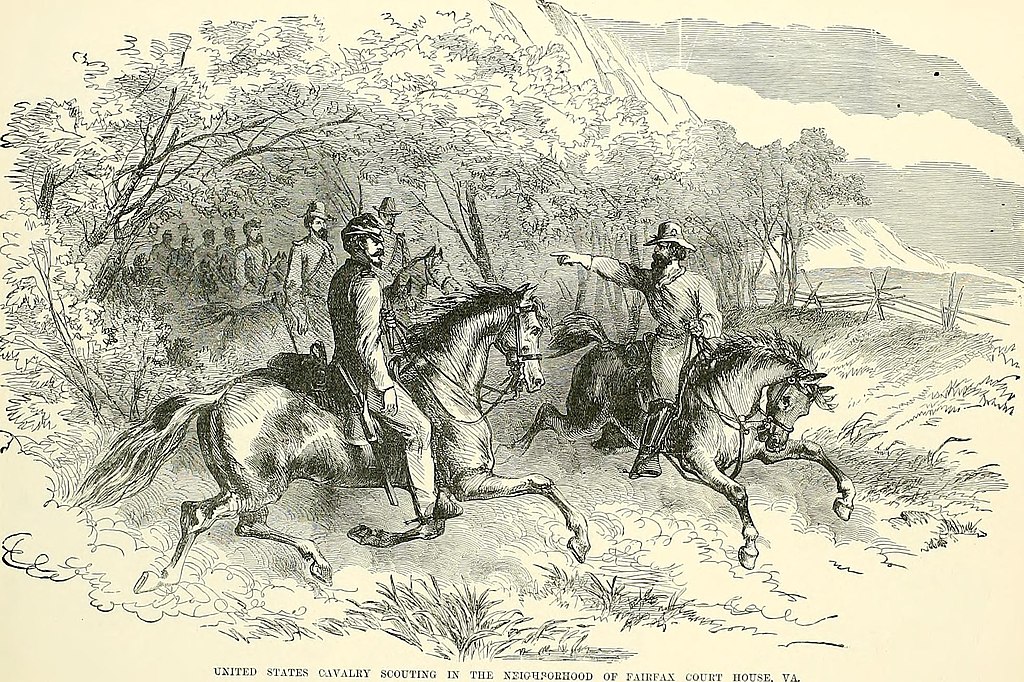 Photo by Internet Archive Book Images on Wikimedia Commons
Photo by Internet Archive Book Images on Wikimedia Commons
7. A Snack For the Lions
Pet owners cover your eyes - in the 18th century, you could pay your admission ticket to the London Zoo by bringing a cat or dog to feed to the lions. Photo by Josie Campbell on Wikimedia Commons
Photo by Josie Campbell on Wikimedia Commons
8. Redheaded Magic
The ancient Greeks had a strange belief that redheads would turn into vampires after they died. It’s rooted in various cultural beliefs that associate red hair with otherworldly powers or origins. Photo by Pai limon on Wikimedia Commons
Photo by Pai limon on Wikimedia Commons
9. An Unhealthy Diet
Here’s one way you should never diet: during the Victorian era, “tapeworm diet” pills were marketed to women as a way to lose weight. The idea was to swallow tapeworm cyst pills, let the tapeworm grow inside you, and then lose weight as it consumed your food. Talk about scary. Photo by Jim Griffin on Wikimedia Commons
Photo by Jim Griffin on Wikimedia Commons
10. The Shortest Recorded War
On August 27, 1896, Britain and Zanzibar headed to war. Zanzibar surrendered just 38 minutes later. Photo by A C Gomes and Sons on Wikimedia Commons
Photo by A C Gomes and Sons on Wikimedia Commons
11. A Real Psychic?!
In 1838, Edgar Allan Poe wrote, “The Narrative of Arthur Gordon Pym of Nantucket,” in which sailors stranded at sea drew lots to see who would be eaten. 46 years later, in a real-life event, a shipwrecked crew drew lots the same way, and the man who was eaten was Richard Parker - the same name Poe used in his story. Photo by W.S. Hartshorn on Wikimedia Commons
Photo by W.S. Hartshorn on Wikimedia Commons
12. The Beard Tax
In the 18th century, Peter the Great of Russia, imposed a “beard tax” to promote a more modern, clean-shaven look that aligned with the look of Western European models. Men who wanted to keep their beards could, but they had to pay a tax and were given a token as proof of payment.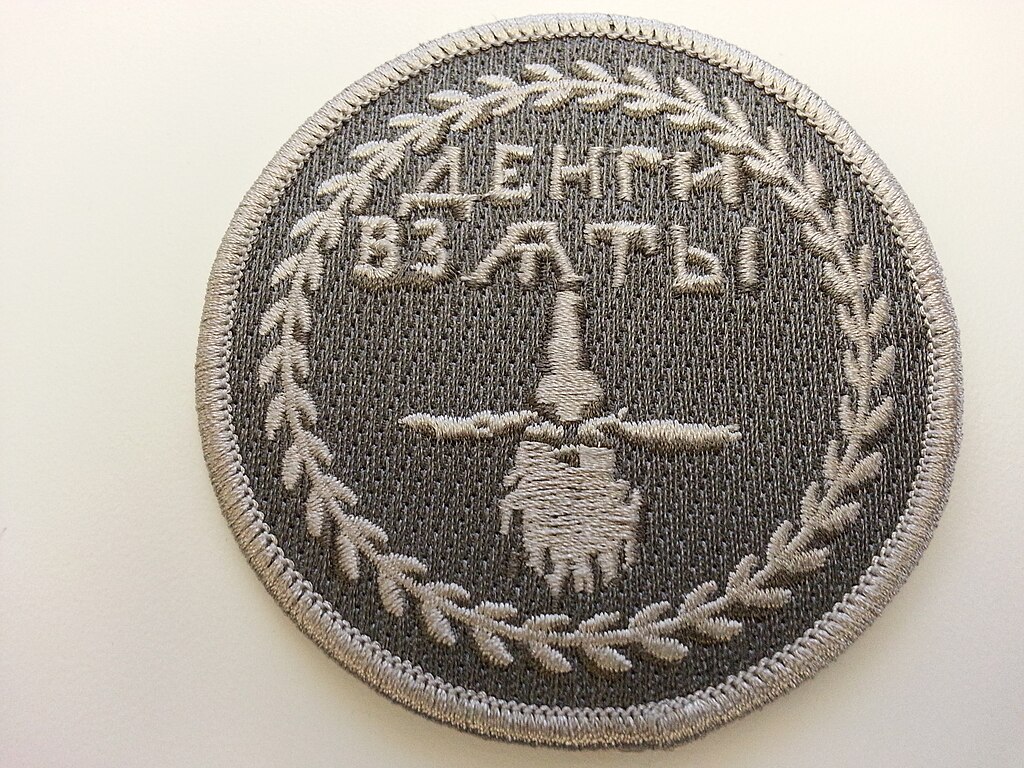 Photo by Ijon on Wikimedia Commons
Photo by Ijon on Wikimedia Commons
13. Outsmarted by Birds
The Great Emu War happened in Australia in 1932 when the military was sent out to kill emus that were destroying crops. Despite using machine guns, the soldiers were outwitted and essentially lost the battle.
 Carlos Delgado on Wikimedia Commons
Carlos Delgado on Wikimedia Commons
14. Poisoned Every Day
In an attempt to gain everlasting life, Roman emperors started taking a small amount of every known poison in a practice called “Mithridatism”. Although it may be effective against certain types of poison, doing this can lead to a deathly accumulation of poison in the body.
 Photo by Karsten Winegeart on Unsplash
Photo by Karsten Winegeart on Unsplash
15. Beavers Aren’t Meat?
During the 16th century, the Catholic Church mistakenly categorized beavers as “fish” because of their aquatic habitat and behaviour, which meant they could be eaten during Lent, a period when meat was traditionally forbidden. Oops. Photo by sempre dilunedi on Unsplash
Photo by sempre dilunedi on Unsplash
16. Atlantis Is Real
Thanks to the myth first originating from Plato’s writing back in 427-437 BC, many believe that Santorini is actually the lost city of Atlantis.  Photo by Taxiarchos228 on Wikimedia Commons
Photo by Taxiarchos228 on Wikimedia Commons
17. Liberty Steaks and Fries
During World War II, hamburgers were temporarily renamed “Liberty Steaks” so they could avoid having to say the German-sounding name. Want some fries with your liberty steak?  Photo by Jonathan Borba on Unsplash
Photo by Jonathan Borba on Unsplash
18. Fart Proudly
Benjamin Franklin once wrote an essay titled “Fart Proudly,” which hilariously suggested that scientists needed to work on making farts smell more pleasant. It was a satirical response to the scientific academies of the time.
 Photo by Joseph-Siffred Duplessis (1725–1802) on Wikimedia Commons
Photo by Joseph-Siffred Duplessis (1725–1802) on Wikimedia Commons
19. Not Even Animals Are Safe
In the Middle Ages, Europe was known for putting animals on trial for various crimes like theft or assault. Shockingly, there are multiple records of pigs, dogs, and even rats being given formal trials and sentences. Sounds like no one was safe!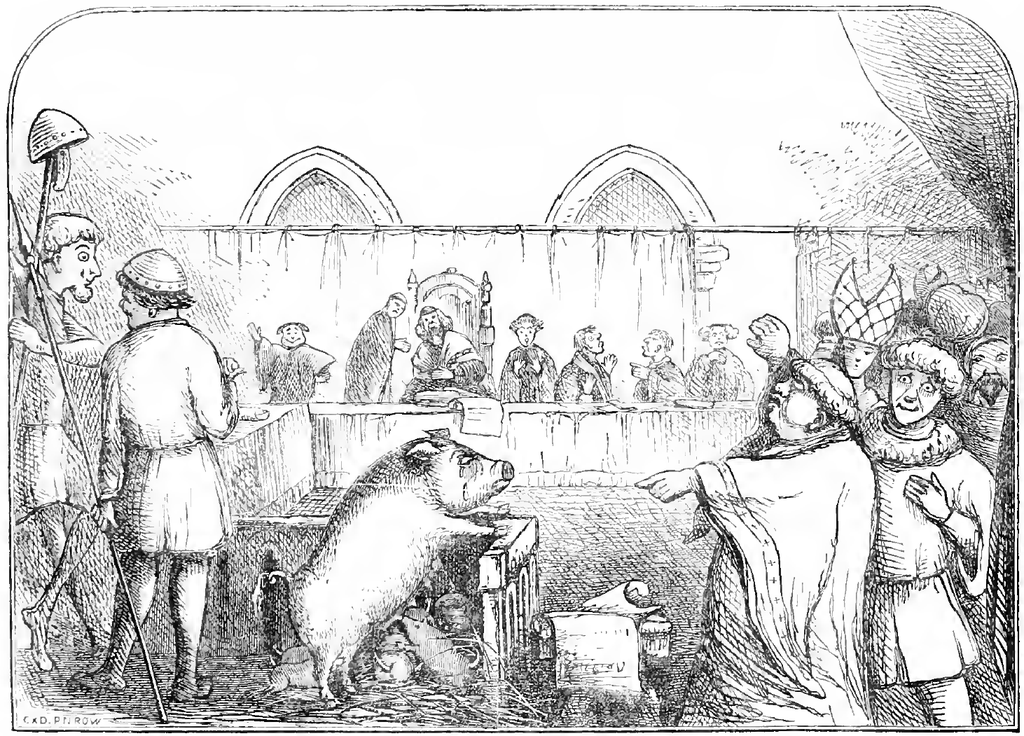 Photo by The book of days: a miscellany of popular antiquities on Wikimedia Commons
Photo by The book of days: a miscellany of popular antiquities on Wikimedia Commons
20. Passport for the King
In 1974, over 3,000 years after his death, the Mummy of Pharaoh Ramesses II was given a valid Egyptian passport so he could be flown into France for an exhibition. His occupation? King (deceased).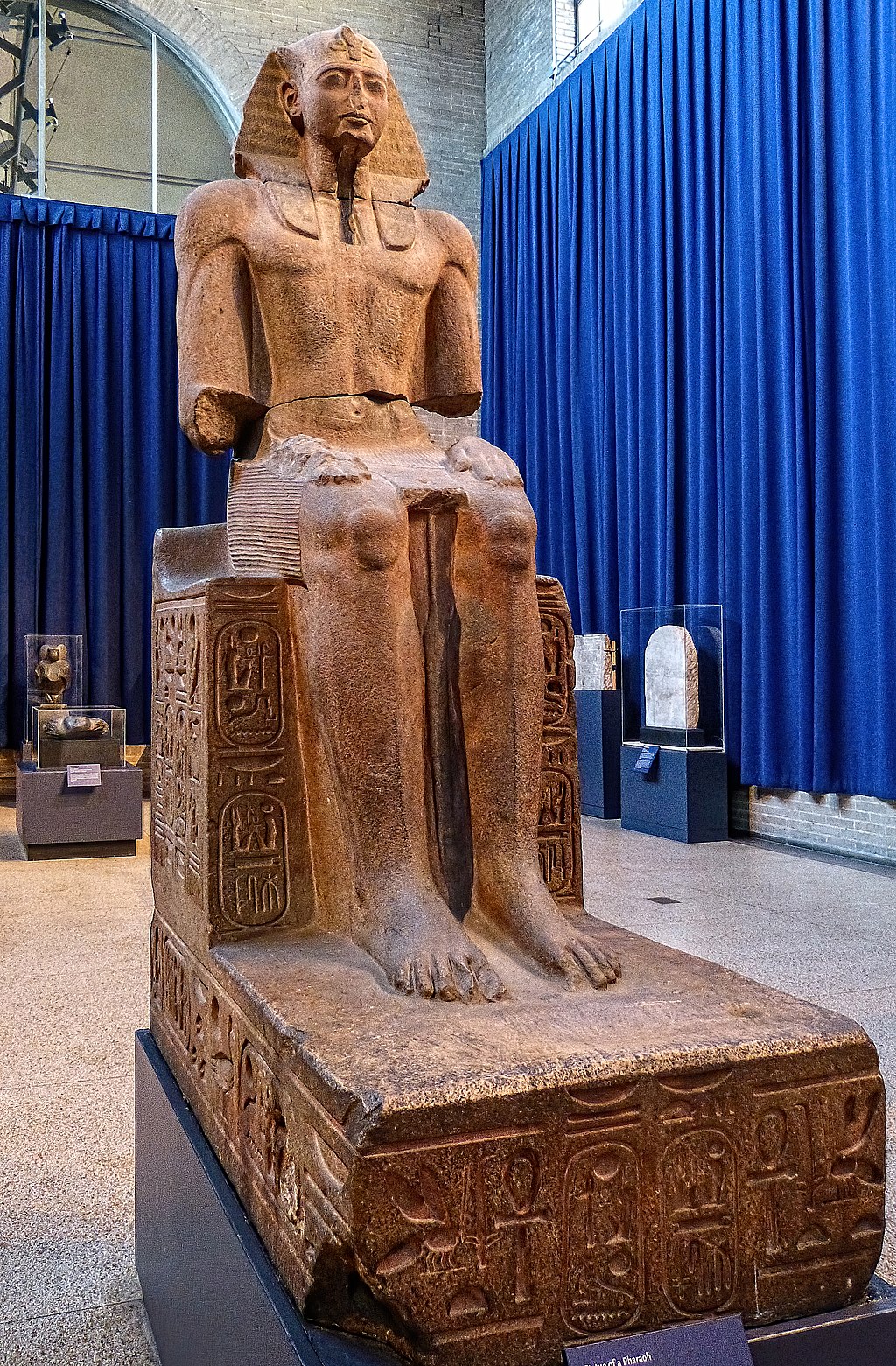 Photo by Mary Harrsch on Wikimedia Commons
Photo by Mary Harrsch on Wikimedia Commons
21. The Ghost Army of World War II
The Allies had a secret weapon on their side during World War II - a unit known as the “Ghost Army” which used inflatable tanks, sound effects, and fake radio transmissions that deceived the Axis powers. They made the enemy believe we had much bigger forces than we actually had! Photo by Vitaly V. Kuzmin on Wikimedia Commons
Photo by Vitaly V. Kuzmin on Wikimedia Commons
22. A King’s Magic Touch
Medieval English and French monarchs practiced the “Royal Touch”, a ritual where it’s believed the King could cure people of a disease known as “King’s Evil” (scrofula) with just a single touch. Thousands would flock to the King, fully believing in his divine right and healing powers. Photo by Unknown Author on Wikimedia Commons
Photo by Unknown Author on Wikimedia Commons
23. Bless You!
Pope Gregory I in the 6th century declared that saying “God bless you” after a sneeze would protect you from the bubonic plague. It certainly caught on because we still say it to this day! Photo by Anonymous on Wikimedia Commons
Photo by Anonymous on Wikimedia Commons
24. A Deep Fear of Beans
The ancient Greek mathematician Pythagoras had a deep hatred and fear towards fava beans. It’s said that he believed these beans contained the souls of the dead and there’s a legend saying he died because he refused to flee through a bean field. Photo by Wellcome Images on Wikimedia Commons
Photo by Wellcome Images on Wikimedia Commons
25. Hot Fashion
The crinoline, a popular women’s fashion accessory in the 19th century, caused numerous fires resulting in many deaths. The large, cage-like structure worn under skirts often brushed against open flames and would cause the entire dress to catch on fire. 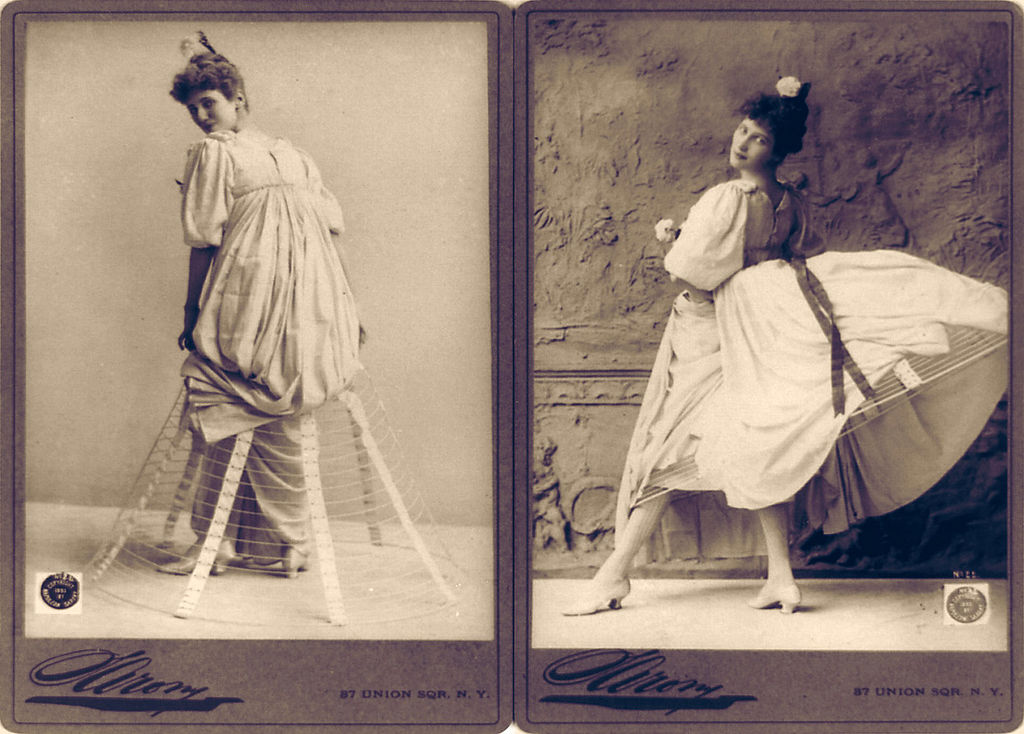 Photo by Napoleon Sarony (1821–1896) on Wikimedia Commons
Photo by Napoleon Sarony (1821–1896) on Wikimedia Commons
26. Tug-of-War Tragedy
Tug-of-war was an official event for one time during the 1912 Olympics. In a bizarre twist of events, Sweden and Denmark wore shoes while the team from the City of London Police wore their regular work boots. This lead to controversy over unfair advantages.
 Photo by The Official Report of the 1912 Summer Olympics on Wikimedia Commons
Photo by The Official Report of the 1912 Summer Olympics on Wikimedia Commons
27. A Battle to The Death Against…A Snail?!
Numerous illustrated manuscripts from the Middle Ages strangely depict knights jousting against giant snails. The reasons for this odd imagery still remain debated by historians!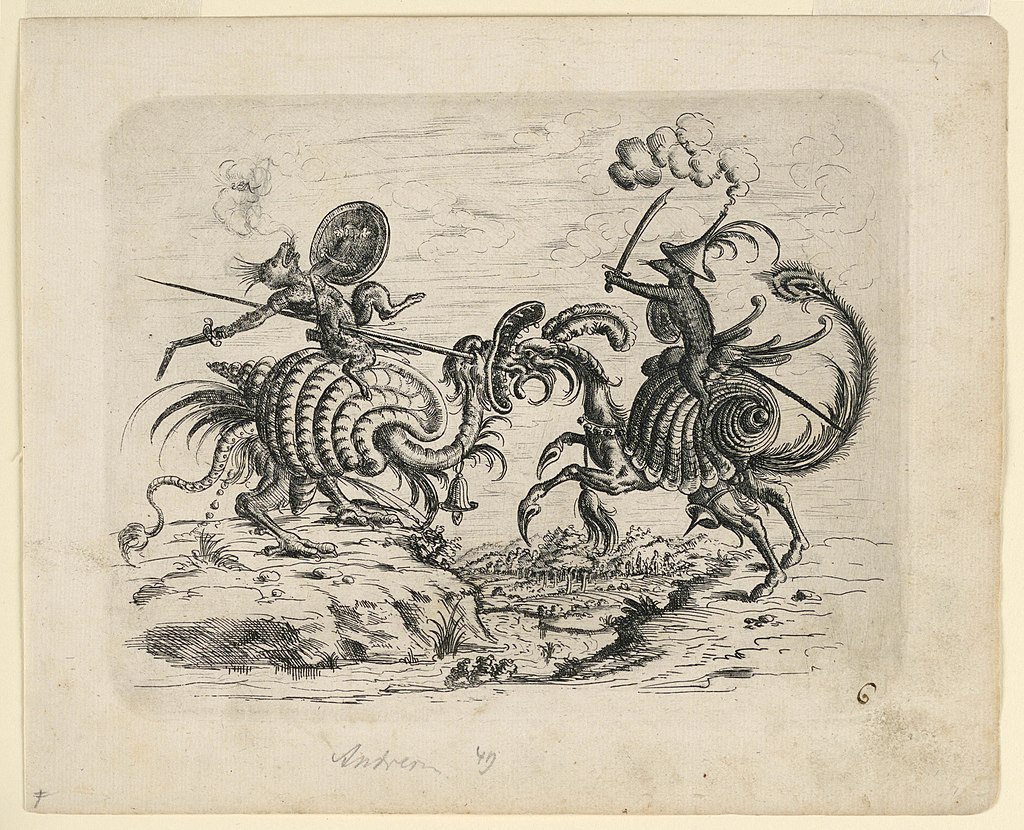 Photo by Unknown artist on Wikimedia Commons
Photo by Unknown artist on Wikimedia Commons
28. The Tale of Three Imposters
King Sebastian of Portugal sadly died in battle in 1578, but over the years, several imposters tried to claim they were him. This led to a very weird situation where three Sebastian imposters were in the same Spanish prison at the same time. Photo by Cristóbal de Morales (fl. 1509–1542) on Wikimedia Commons
Photo by Cristóbal de Morales (fl. 1509–1542) on Wikimedia Commons
29. An Unnatural Change
After the terrible Chernobyl explosion that affected the Soviet Union, firefighters were sent directly into the center of radiation to extinguish the flames. It’s said that the radiation was so extreme here that one firefighter’s eyes turned from brown to blue! Now that’s not natural.
 Photo by 🐣 Luca Iaconelli 🦊 on Unsplash
Photo by 🐣 Luca Iaconelli 🦊 on Unsplash
30. Fancy Teeth
Back in the Viking era, teeth were so valued that it led to the first known form of cosmetic dentistry. Vikings would carve grooves into their teeth and fill them with dye as a way to enhance their appearance and status. Photo by The Swedish History Museum, Stockholm from Sweden on Wikimedia Commons
Photo by The Swedish History Museum, Stockholm from Sweden on Wikimedia Commons
31. First Cigarettes In Ancient Egypt
Archaeologists have discovered remnants of thin gold tubes from ancient Egyptian tombs which they've come to believe were used to roll or smoke herbal mixtures. These were possibly the world's first ever "cigarettes"!
 Photo by Vyacheslav Argenberg on Wikimedia Commons
Photo by Vyacheslav Argenberg on Wikimedia Commons
32. Control Your Laughter!
In the 21st century, "Competitive Endurance Tickling" briefly became a bizarre underground sport, with participants tied up and tickled for extended periods. The strange phenomenon was even the subject of a documentary in 2016.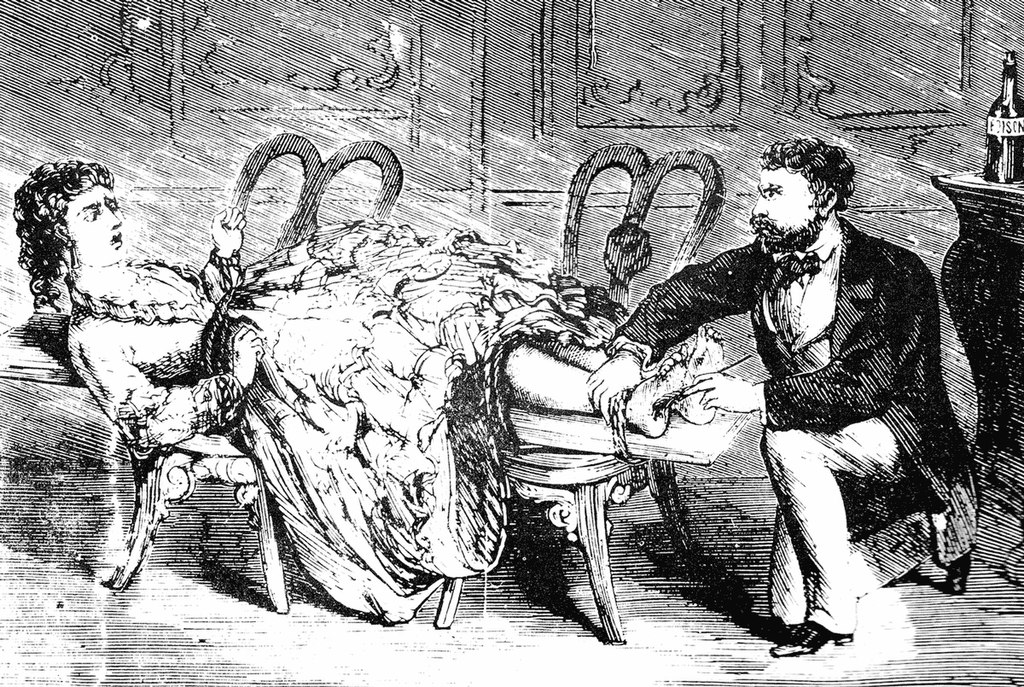 Photo by Unknown author on Wikimedia Commons
Photo by Unknown author on Wikimedia Commons
33. Coconut to the Rescue
During World War II, future U.S. President John F. Kennedy saved his crew by carving an SOS message into a coconut after their PT boat was sunk. This coconut became a presidential keepsake, displayed in the Oval Office during his term.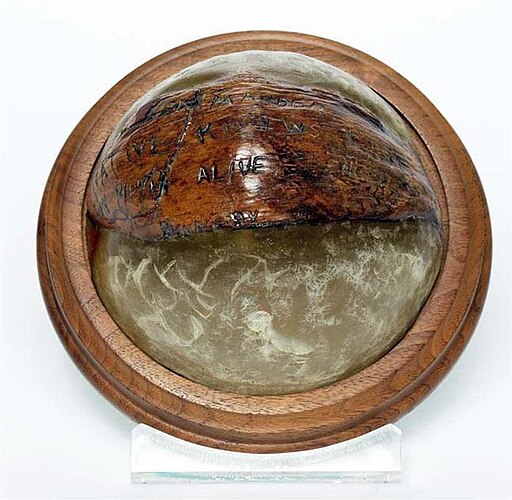 Photo by jfklibrary.org on Wikimedia Commons
Photo by jfklibrary.org on Wikimedia Commons
34. Green Fashion is Deadly
In the 19th century, green dye used in dresses contained arsensic, which was incredibly deadly and led to numerous illnesses and deaths. Even then, the fashion industry kept using it until the deaths skyrocketed and public protesting forced a change. The color green can't be that worth it, can it? Photo by Amélie Legrand de Saint-Aubin (1797–1878) on Wikimedia Commons
Photo by Amélie Legrand de Saint-Aubin (1797–1878) on Wikimedia Commons
35. Operation Acoustic Kitty
In the 1960s, the CIA very randomly spent $20 million on "Operation Acoustic Kitty," with the intention of using cats as eavesdropping devices. But after a horrible incident during a test run, the project was quickly abandoned.
 Photo by The Lucky Neko on Unsplash
Photo by The Lucky Neko on Unsplash
36. Competing Bare
In Ancient Greece, athletes in the Olympic Games would compete completely naked. Why? It was believed that nudity emphasized the athletic prowess and the beauty of the male body.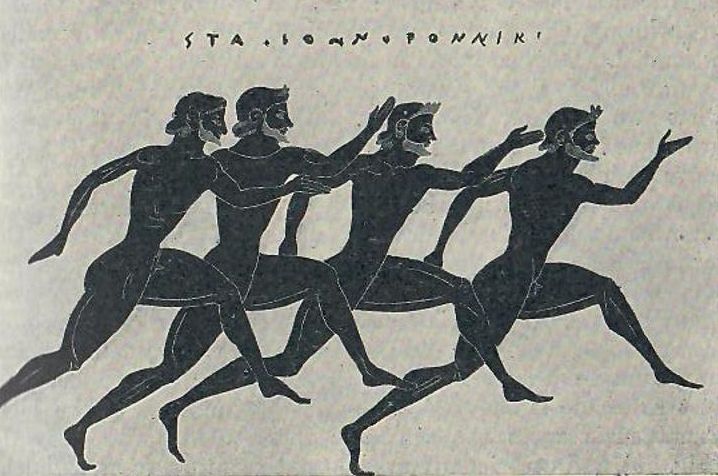 Photo by RickyBennison on Wikimedia Commons
Photo by RickyBennison on Wikimedia Commons
37. Human Chess
The town of Marostica in Italy has held a human chess game every other year since 1954. The tradition is based on a 1454 story where two noblemen settled their rivalry over a woman by playing chess using real people as pieces. Weird, but cool!
38. The Tomato Trials
Turns out Americans weren't always a fan of tomatoes! In the early days, they believed tomatoes were poisonous until 1820 when Colonel Robert Gibbon Johnson bravely ate a basket of tomatoes in front of a horrified crowd. That was enough to slowly dispel the myth. Photo by Tom Hermans on Unsplash
Photo by Tom Hermans on Unsplash
39. The Pony Express
Genghis Khan established a medieval "pony express" system across his vast empire. Known as the Yam, this relay system allowed messages and goods to travel swiftly across the Mongol territories, stretching from Europe to Asia. It sure was effective! Photo by Unknown author on Wikimedia Commons
Photo by Unknown author on Wikimedia Commons
40. Speaking in Whistles
The Canary Island of La Gomera is home to a unique, ancient language called "Silbo Gomero," which is entirely whistled. Originally developed by the island's indigenous people, it's still taught in schools today. Photo by Reinhard Link from Germany on Wikimedia Commons
Photo by Reinhard Link from Germany on Wikimedia Commons
41. A Pointless War
In 1925, a conflict between Greece and Bulgaria, called the "War of the Stray Dog," was triggered by a dog crossing the border. This resulted in several days of skirmishes and a number of casualties before the League of Nations intervened.
 Photo by National Library of Scotland on Wikimedia Commons
Photo by National Library of Scotland on Wikimedia Commons
42. How Much Do You Know About Cleopatra?
Despite what you may believe, did you know Cleopatra actually lived closer in time to the invention of the iPhone than to the construction of the Great Pyramid of Giza? While the pyramid dates back to around 2560 BC, Cleopatra's reign began in 51 BC.  Photo by RubaMorsi on Wikimedia Commons
Photo by RubaMorsi on Wikimedia Commons
43. The Real Winnie-the-Pooh
Winnie-the-Pooh was inspired by a real bear named Winnie, a mascot for Canadian soldiers during World War I. The bear was eventually given to the London Zoo, where author A.A. Milne and his son, Christopher Robin, encountered her and gave inspiration for the future beloved character.
 Photo by Ernest Howard Shepard (1879–1976) on Wikimedia Commons
Photo by Ernest Howard Shepard (1879–1976) on Wikimedia Commons
44. Your Heart is Mine
Mary Shelley, best known for writing Frankenstein, had her dead husband's heart kept hidden away in her desk. After drowning in a boating accident, he was cremated, but his heart was found still intact. So for whatever, reason, Shelley thought it'd be a good idea to keep it with her. Photo by Richard Rothwell (1800–1868) on Wikimedia Commons
Photo by Richard Rothwell (1800–1868) on Wikimedia Commons
45. The Dancing Plague
In 1518, the city of Strasbourg was struck by a bizarre phenomenon: a "dancing plague" where hundreds danced uncontrollably for days. Many of those affected eventually collapsed or even died from heart attacks and exhaustion. It's said to have claimed around 400 victims! Photo by Unknown author on Wikimedia Commons
Photo by Unknown author on Wikimedia Commons







